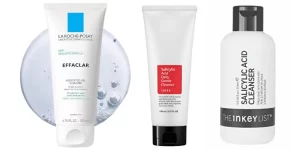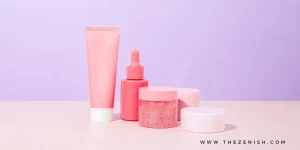
If you’re struggling with acne, you might be tempted to try anything that promises to clear your skin.
But before you slather on some random cream that you found in your medicine cabinet, you should know that not all products are safe or effective for acne.
In fact, some creams can actually make your acne worse or damage your skin. Two examples of these are Neosporin and triamcinolone acetonide.
You might have heard of these creams as treatments for acne, but they’re really not meant for that purpose.
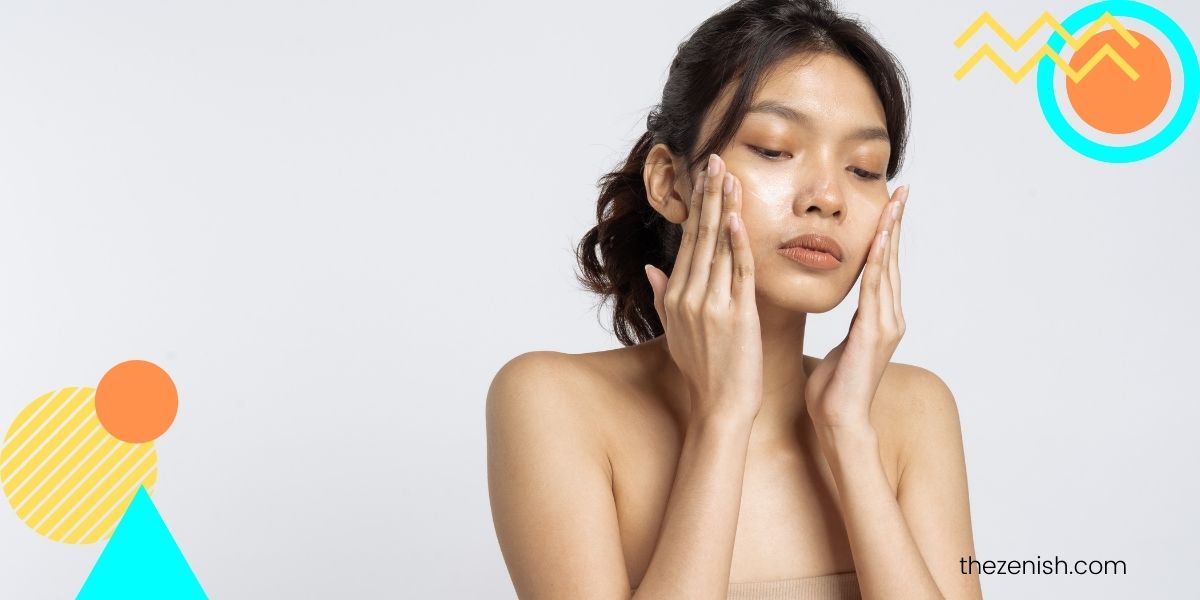
They can cause irritation, hair growth, and other side effects that you don’t want on your face.
So before you use triamcinolone acetonide for acne and risk harming your skin with these creams, let’s find out what they are, how they work, and why you should avoid them for acne.
Plus, I’ll share some better alternatives that will help you get rid of acne without compromising your skin health.
| this post may contain affiliate links, which means if you purchase from one of these links, I may receive a small commission at no additional cost to you. |
What is Triamcinolone Acetonide?
Triamcinolone acetonide is a type of synthetic corticosteroid that works by suppressing the immune system.
It can be injected into the skin or muscle to treat itching, eczema, and other skin conditions in both adults and children.
It can also be applied as a cream to reduce inflammation, redness, and swelling from various skin problems such as eczema, dermatitis, or psoriasis.
However, triamcinolone acetonide cream isn’t approved for acne and shouldn’t be used on your face unless instructed by a doctor.
This is because it’s a steroid, and if used incorrectly it can really irritate your skin and make your acne much worse.
Steroids aren’t good for long-term use.
If used longer than necessary they may cause high blood sugar levels, increased risk of infections, increased pressure in the eye, diabetes, cataracts, glaucoma, thinning bones, and thinning skin.
Can triamcinolone acetonide be used for acne?
Well, the short answer is no. But let me explain why.
As I mentioned earlier, Triamcinolone acetonide is a type of steroid that can treat various skin conditions like eczema, psoriasis, and allergies.
It works by reducing inflammation and suppressing the immune system.
Sounds good, right?
Well, not so fast.
The problem is that triamcinolone acetonide cream isn’t meant for acne.
In fact, it can make your acne worse by causing more inflammation and infection, clogging pores, and triggering breakouts.
That’s because steroids can mess up your hormones and trigger more oil production and breakouts.
The only exception is if you have cystic acne, which is a severe form of acne that causes large, painful bumps under the skin.
In that case, you may benefit from triamcinolone acetonide injections.
These are shots that your dermatologist can give you directly into the cysts to reduce their size and inflammation.
But this isn’t something you can do at home, so don’t try to inject yourself with anything!
Does triamcinolone help cystic acne?
Triamcinolone acetonide is usually used for skin conditions like eczema and psoriasis, but it can also be injected into cystic acne lesions by a dermatologist.
This is a procedure called intralesional corticosteroid injection or steroid shot.
This can help shrink the cysts and make them less noticeable and less sore.
Some people see results in just a few hours after the injection.
Sounds amazing, right?
But before you get too excited, let me warn you: triamcinolone acetonide injections aren’t a miracle cure for cystic acne.
They have some serious drawbacks that you need to be aware of.
First of all, they can cause side effects like skin thinning, lightening, redness, and infection.
These side effects can last for a long time and may need additional treatments to fix.
Second of all, they don’t prevent new cysts from forming.
They only treat the existing ones. So you may need to get multiple injections over time to keep your skin clear.
So what’s the bottom line?
Triamcinolone acetonide injections can be a helpful option for cystic acne, but they’re not for everyone.
They should only be used as a last resort when other treatments have failed and under the guidance of a dermatologist and they’re certainly not a substitute for a good skincare routine.
So what can you do if you have acne?
Well, there are many other options that are safer and more effective than triamcinolone acetonide cream.
For example, you can try washing your face twice a day with a gentle cleanser, exfoliating your skin with a product that contains salicylic acid, or using topical treatments that contain benzoyl peroxide or retinoids.
These are all ingredients that can help unclog your pores, kill bacteria, and prevent new pimples from forming.
1. Cleanse
The first step to clear skin is to cleanse it properly.
Cleansing removes dirt, oil, makeup, and bacteria from your skin and prevents clogged pores and acne.
But you don’t need a harsh cleanser that strips your skin of its natural oils and moisture.
That can cause dryness, irritation, and more oil production.
Instead, use a gentle cleanser that suits your skin type and doesn’t contain any harsh chemicals or fragrances.
A gentle cleanser will cleanse your skin without disrupting its pH balance or barrier function.
Some of my favorite gentle cleansers are:
Ursa Major Fantastic Face Wash
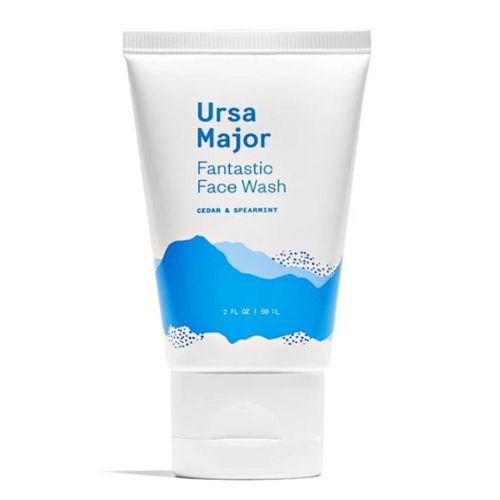
This natural, vegan cleanser contains soothing aloe vera, hydrating coconut oil, and exfoliating willow bark extract.
It cleanses your skin without drying it out, leaving it feeling fresh and smooth.
AHOY LOVE Nourishing Cream Cleanser
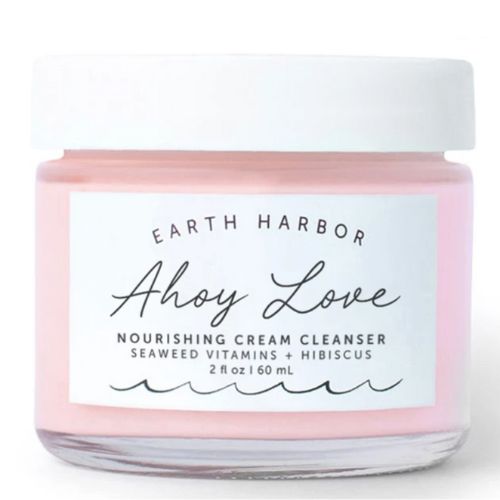
This creamy, moisturizing cleanser contains organic coconut oil, jojoba oil, and rosehip oil to nourish the skin while removing impurities and makeup.
It also has anti-inflammatory and antibacterial properties that help calm acne-prone skin.
La Roche Posay Toleriane Hydrating Gentle Cleanser
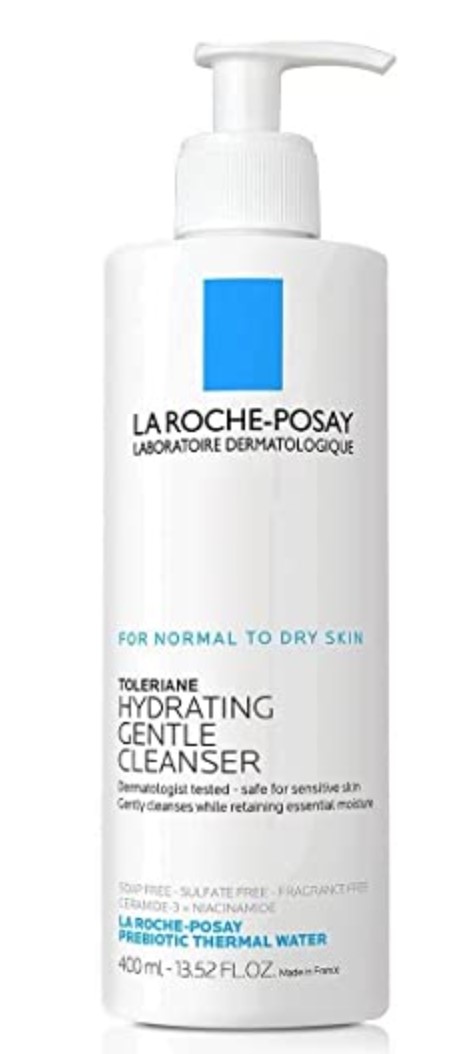
This dermatologist-recommended cleanser contains glycerin, niacinamide, and ceramides, which hydrate and cleanse the skin while helping to restore its protective barrier.
It’s also fragrance-free, paraben-free, and non-comedogenic.
2. Exfoliate
The next step to clear skin is to exfoliate it regularly.
Exfoliating removes dead skin cells from the surface of your skin and unclogs pores. This helps prevent acne and improves your skin’s tone and texture.
But you don’t need a harsh scrub that scratches your skin and causes micro-tears. That can cause inflammation, infection, and scarring.
Instead, use a chemical exfoliant that dissolves the bonds between dead skin cells and gently loosens them.
This will exfoliate your skin without damaging it or causing irritation.
Salicylic acid, a type of beta-hydroxy acid (BHA), is one of the best chemical exfoliants for acne.
It penetrates deep into the pores, breaking down the oil and debris that causes acne, while also reducing redness and swelling due to its anti-inflammatory and antibacterial properties.
Some of my favorite products with salicylic acid are:
Paula’s Choice CLEAR Extra Strength Exfoliator
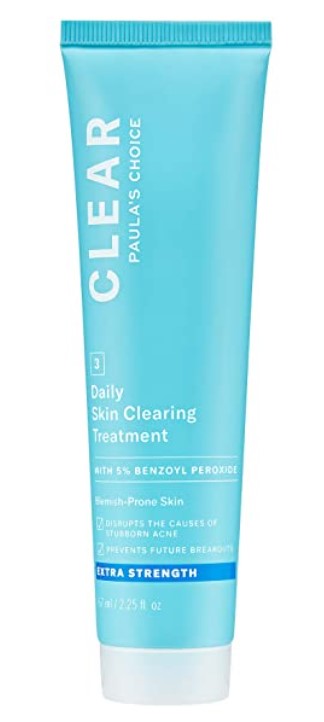
This liquid exfoliant contains 2% salicylic acid, green tea extract, and allantoin.
It clears pores, fights acne, soothes irritation, and evens out skin tone.
Additionally, it’s fragrance-free, alcohol-free, and cruelty-free.
Cure Natural Aqua Gel Exfoliator
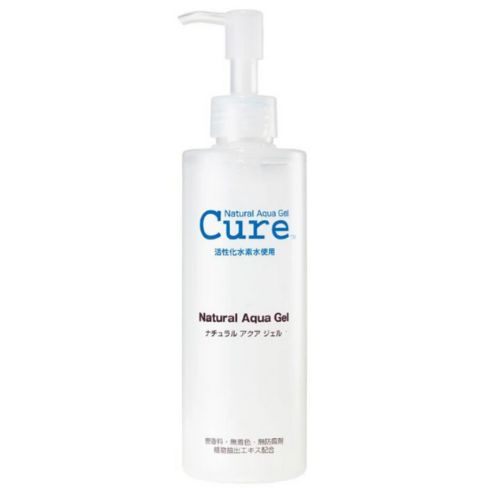
This gel exfoliant contains natural ingredients such as water, glycerin, rosemary extract, and aloe vera extract.
It gently removes dead skin cells without any harsh chemicals or abrasives and is hypoallergenic, fragrance-free, and color-free.
COSRX AHA + BHA Clarifying Treatment Toner
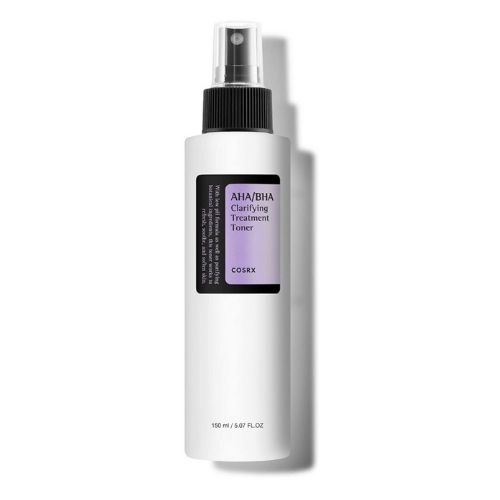
This toner contains both Alpha-Hydroxy Acids (AHAs) and Beta-Hydroxy Acids (BHAs) to exfoliate your skin on different levels.
AHAs, such as glycolic acid and lactic acid, work on the surface of your skin to smooth out fine lines and brighten your complexion.
BHAs such as salicylic acid work deep in your pores to clear out acne-causing bacteria and oil.
This toner also contains mineral water, willow bark water, apple water, and betaine salicylate to hydrate, soothe, and balance your skin.
3. Spot Treat
The last step to clear skin is to spot and treat any pimples that pop up on your face.
Spot treating helps target specific areas of inflammation and infection without affecting the rest of your skin.
But you don’t need a harsh spot treatment that burns your skin and causes peeling or flaking. That can cause more irritation and scarring.
Instead, use a gentle spot treatment that contains an active ingredient that kills bacteria, reduces inflammation, and speeds up healing.
One of the best active ingredients for spot-treating acne is benzoyl peroxide.
Benzoyl peroxide is an organic compound that works by releasing oxygen into the pores, killing the bacteria that cause acne, drying out excess oil, and removing dead skin cells that clog pores.
Benzoyl peroxide comes in different strengths and forms, such as gels, creams, or lotions.
You can find it over-the-counter or get a prescription from your doctor.
Some of my favorite products with benzoyl peroxide are:
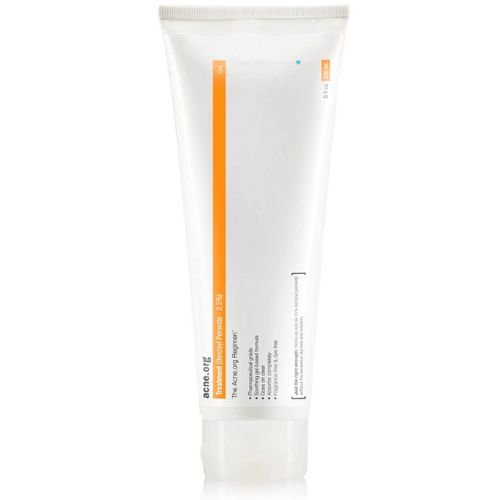
This is a gel treatment that contains 2.5% benzoyl peroxide along with glycerin and allantoin.
It’s gentle enough for daily use and effective enough to clear moderate to severe acne.
It’s also fragrance-free, dye-free, and cruelty-free.
AHA-BHA-PHA 30 Days Miracle Serum
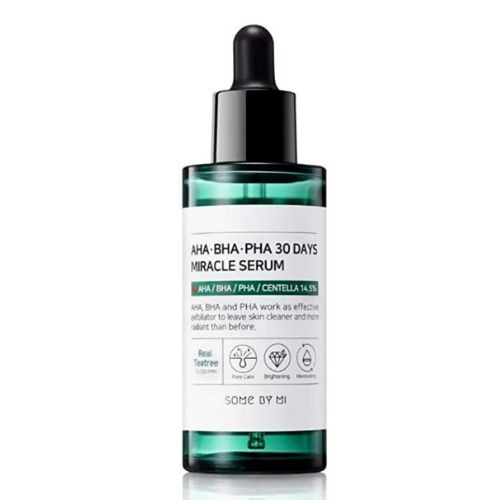
This serum contains not only benzoyl peroxide but also AHAs, BHAs, and PHAs to exfoliate, hydrate, and brighten the skin.
This product also includes tea tree oil, centella asiatica extract, and niacinamide to soothe, heal, and protect the skin.
It’s suitable for all skin types and helps prevent acne scars and hyperpigmentation.
NEBULA Adaptogen Clarity Ampoule
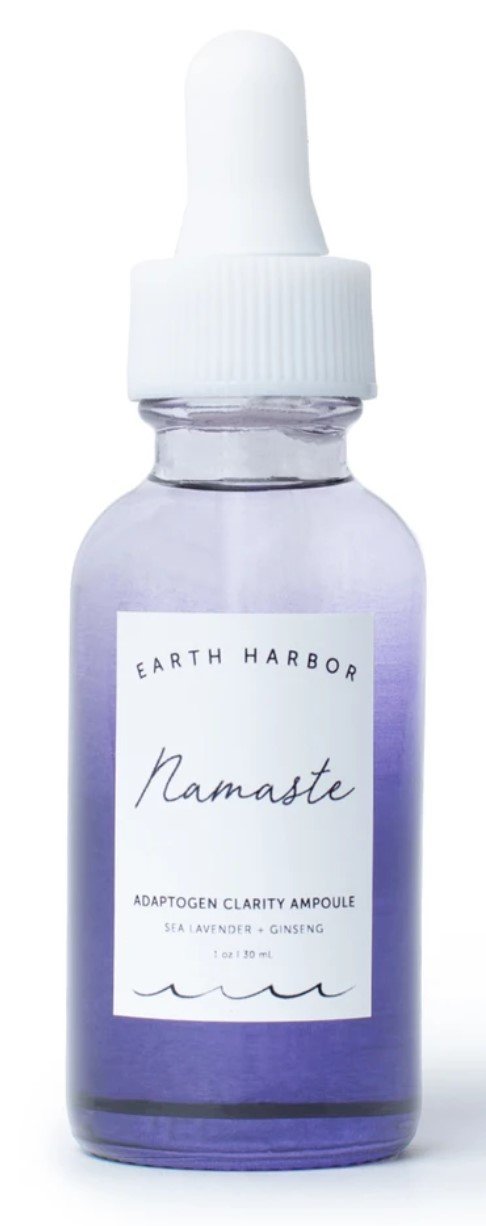
This ampoule contains 5% benzoyl peroxide, as well as adaptogens such as ashwagandha, reishi mushroom, and licorice root to help your skin cope with stress and inflammation, boost its immunity and resilience, and clear acne while nourishing and balancing it.
FAQs
Can you use triamcinolone acetonide cream for dark spots and scars?
No, triamcinolone acetonide cream isn’t an effective treatment for dark spots or scars.
In fact, it can worsen them by thinning the skin and causing hypopigmentation or hyperpigmentation.
If you want to fade dark spots or scars, you should use products containing ingredients such as AHAs, Vitamin C, Retinoids, or Niacinamide.
These ingredients help to exfoliate, brighten, stimulate collagen production, and improve the texture and tone of your skin.
Some of my favorite products for dark spots and scars are:
The Ordinary Glycolic Acid 7% Toning Solution
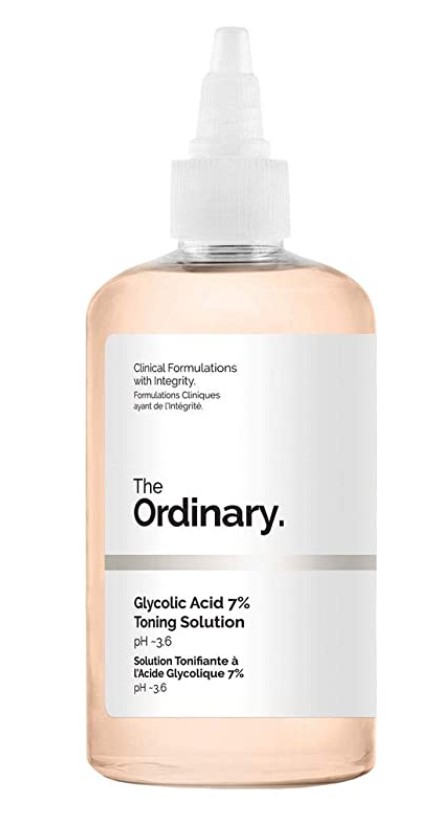
This toning solution contains 7% glycolic acid, aloe vera, ginseng, and Tasmanian pepper berry.
Glycolic acid, an AHA, helps remove dead skin cells and reveal brighter, newer skin.
Aloe vera, ginseng, and Tasmanian pepper berries help soothe and hydrate your skin.
This toning solution helps fade dark spots and scars, improving your skin’s clarity and smoothness.
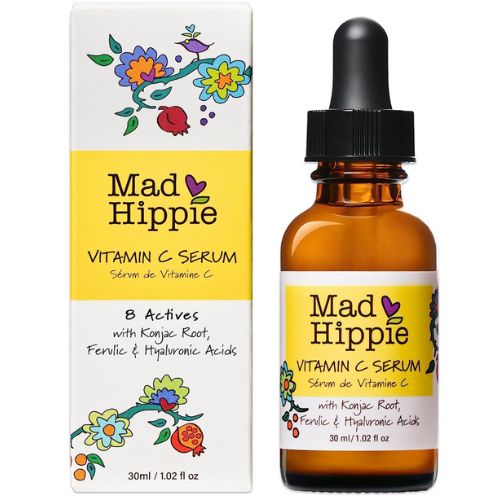
This serum contains Vitamin C, Vitamin E, Ferulic Acid, Hyaluronic Acid, Konjac Root Powder, Grapefruit Extract, and Chamomile Extract.
Vitamin C is a powerful antioxidant that helps protect your skin from free radical damage and boosts collagen production.
This serum helps to moisturize, plump, firm, and calm your skin while lightening dark spots and scars, and enhancing your skin’s radiance and elasticity.
It contains Vitamin E, ferulic acid, hyaluronic acid, konjac root powder, grapefruit extract, and chamomile extract.
Differin Adapalene Gel 0.1% Acne Treatment
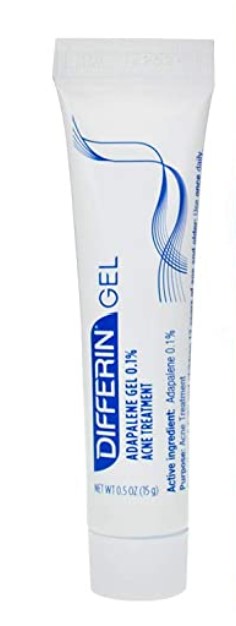
This gel treatment contains adapalene, a type of retinoid.
Retinoids are derivatives of vitamin A that help regulate cell turnover and reduce inflammation in the skin.
Adapalene helps unclog pores, prevent acne formation, reduce acne marks, and smooth out fine lines and wrinkles.
This gel treatment can improve the appearance of dark spots and scars while also preventing new ones from forming.
Is triamcinolone acetonide cream good for wrinkles?
No, Triamcinolone Acetonide cream will not reduce the appearance of fine lines or wrinkles; in fact, it can make them worse by thinning the skin and causing atrophy or sagging.
If you want to prevent or treat wrinkles, you should use products that contain ingredients such as retinoids, peptides, antioxidants, or hyaluronic acid.
These ingredients help stimulate collagen production, repair skin damage, combat free radicals, and hydrate your skin.
Some of my favorite products for wrinkles are:
RoC Retinol Correxion Deep Wrinkle Night Cream
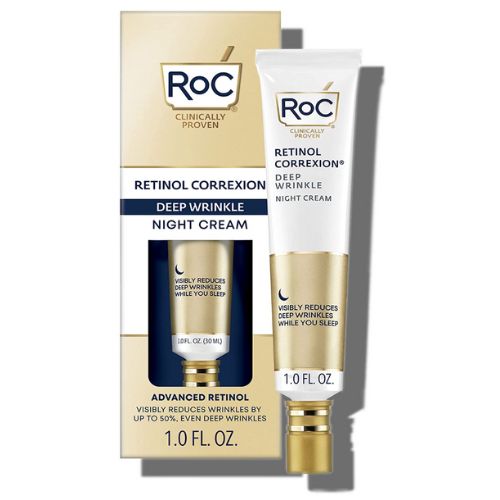
This night cream contains Retinol, Glycerin, and Shea Butter.
Retinol, a type of Retinoid, helps smooth out wrinkles and fine lines by increasing your skin’s cell turnover and collagen synthesis.
Glycerin and Shea Butter help moisturize and nourish your skin.
This night cream helps to reduce the appearance of deep wrinkles and improve your skin’s texture and firmness.
Olay Regenerist Micro-Sculpting Cream
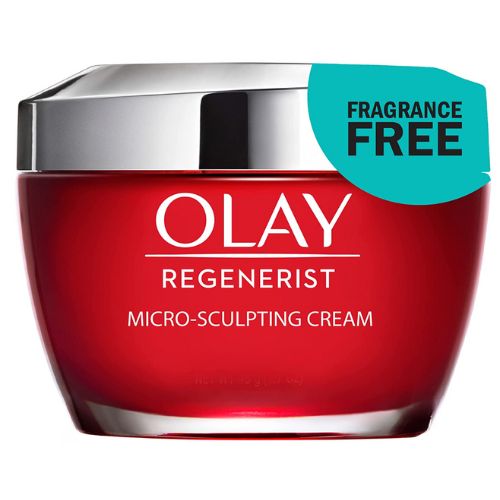
This cream contains peptides, niacinamide, vitamin E, hyaluronic acid, and green tea extract.
Peptides, which are short chains of amino acids, help signal the skin to produce more collagen and elastin.
This cream helps to lift and sculpt the skin while diminishing wrinkles and fine lines.
It’s enriched with niacinamide, vitamin E, hyaluronic acid, and green tea extract to help brighten, protect, plump, and soothe the skin.
CeraVe Skin Renewing Vitamin C Serum
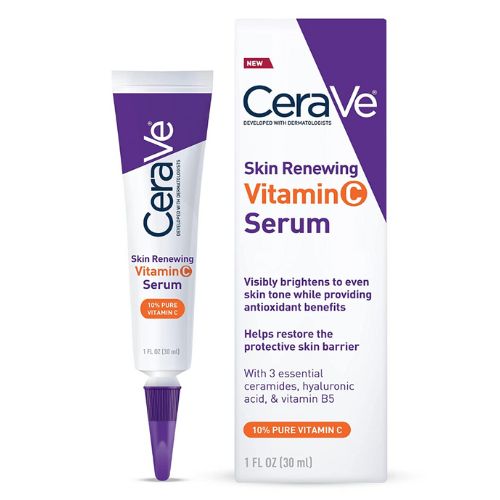
This serum contains Vitamin C, ceramides, hyaluronic acid, and Vitamin B5.
Vitamin C is a powerful antioxidant that helps protect the skin from free radical damage and boosts collagen production.
This serum is a lifesaver for your skin!
Ceramides, hyaluronic acid, and vitamin B5 help to restore your skin’s barrier function and hydrate it.
Not only that, but it also aids in improving your skin’s tone and texture while reducing wrinkles and fine lines.
Can you use triamcinolone acetonide cream for eczema?
Yes, triamcinolone acetonide cream can be used to treat eczema, but only under a doctor’s supervision.
Eczema is a chronic skin condition characterized by inflammation, itching, and dryness.
Triamcinolone acetonide cream can help reduce symptoms by suppressing the immune system and blocking the production of inflammatory substances.
However, it should only be used as a short-term treatment for eczema flare-ups, as prescribed by a doctor, and in conjunction with other treatments such as moisturizers, emollients, and antihistamines.
Can you use triamcinolone acetonide cream for ringworm?
No, triamcinolone acetonide cream isn’t an effective treatment for ringworm.
Ringworm is a fungal infection that causes red, scaly, and itchy patches on the skin.
Triamcinolone acetonide cream isn’t effective against fungi and can actually make the infection worse, as it suppresses the immune system and allows the fungus to grow and spread.
Instead, use an antifungal cream containing ingredients such as clotrimazole, miconazole, or terbinafine.
These ingredients kill the fungus and prevent it from multiplying.
You should apply the antifungal cream twice a day for at least two weeks or until the infection clears up.
You should keep the affected area clean and dry, and avoid sharing personal items such as towels, clothes, or bedding with others.
Additionally, it’s important to wash your hands thoroughly after touching the infected area in order to prevent spreading the infection to other parts of your body or to other people.
Can you use triamcinolone acetonide cream for poison ivy?
Yes, triamcinolone acetonide cream can be used for poison ivy, but only as a last resort.
Poison ivy contains a substance called urushiol, which causes an allergic reaction on the skin, resulting in redness, swelling, itching, and blisters.
Triamcinolone acetonide cream can help relieve symptoms of poison ivy, such as inflammation and itching, but it doesn’t cure it or remove the urushiol from the skin.
Therefore, it should only be used for poison ivy if other treatments fail or are not available, and should be used sparingly and only on small areas of the skin.
In addition to this treatment, you should also use other methods such as washing the affected area with soap and water, applying cold compresses or calamine lotion, or taking antihistamines to reduce the allergic reaction.
Can you use triamcinolone acetonide cream for cold sores?
No, triamcinolone acetonide cream isn’t a good treatment for cold sores (blisters that form on the lips or around the mouth, caused by the herpes simplex virus (HSV)).
Triamcinolone acetonide cream is not effective against viruses and can actually make the cold sores worse, as it suppresses the immune system and delays the healing process.
Instead of using triamcinolone acetonide cream for cold sores, you should use an antiviral cream containing ingredients such as acyclovir, penciclovir, or docosanol.
These ingredients inhibit the replication of the HSV virus and speed up the healing of the cold sores.
You should apply the antiviral cream as soon as you feel a tingling or burning sensation on your lip or around your mouth, which indicates that a cold sore is about to form.
You should also keep the affected area clean and dry and avoid touching or picking at the cold sores.
You should also avoid kissing or sharing personal items, such as lip balm, utensils, or cups, with others.
Additionally, you should wash your hands thoroughly after touching the cold sores to prevent spreading the infection to other parts of your body or to other people.
Can you use triamcinolone acetonide cream for diaper rash?
Yes, triamcinolone acetonide cream can be used for diaper rash, but only under a doctor’s supervision.
Diaper rash is a skin irritation that occurs in the diaper area of babies and toddlers and can be caused by wetness, friction, urine, feces, bacteria, yeast, or allergies.
Triamcinolone acetonide cream can help reduce inflammation and itching from diaper rash by suppressing the immune system and blocking the production of inflammatory substances.
However, don’t use it for extended periods of time on large areas of the skin, as it can cause side effects such as thinning of the skin, stretch marks, spider veins, and skin infections.
It should only be used for diaper rash as a short-term treatment and only as prescribed by a doctor, as it can interfere with the skin’s natural healing process and make it more sensitive to external irritants.
It should also be used in conjunction with other treatments such as changing diapers frequently, using gentle wipes or water to clean the diaper area, applying barrier creams or ointments such as zinc oxide or petroleum jelly, or avoiding fragrances, dyes, or chemicals in diapers or wipes.
Can you use triamcinolone acetonide cream for psoriasis?
Yes, triamcinolone acetonide cream can be used for psoriasis, but only under the supervision of a doctor.
Psoriasis is a chronic skin condition characterized by red, scaly, and itchy patches on the skin, caused by an overactive immune system producing too many skin cells.
Triamcinolone acetonide cream can help reduce inflammation and itching from psoriasis by suppressing the immune system and inhibiting the production of inflammatory substances.
However, triamcinolone acetonide cream isn’t a cure for psoriasis and does not stop the underlying cause of the condition.
Additionally, it can cause side effects such as thinning skin, stretch marks, spider veins, and skin infections.
Therefore, triamcinolone acetonide cream should only be used for psoriasis as a short-term treatment, and only as prescribed by a doctor.
It should also be used in conjunction with other treatments, such as moisturizers, emollients, coal tar, salicylic acid, vitamin D analogs, or biologics.
Final Thoughts
Instead of using triamcinolone acetonide for acne, you should use products that contain ingredients that are proven to be safe and effective, such as salicylic acid, benzoyl peroxide, or adapalene.
You should also use products containing ingredients that can help fade dark spots and scars, such as AHAs, vitamin C, or retinoids.
Additionally, products containing ingredients that can help prevent or treat wrinkles, such as retinoids, peptides, antioxidants, or hyaluronic acid, should be used.
By using the right products for your skin type and concerns, you can achieve clear, healthy, and youthful-looking skin without risking any damage from Triamcinolone Acetonide.

